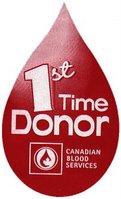 I accompanied some colleagues to the blood donor clinic. I was supposed to photograph them for our company newsletter, but they talked me into donating since I was already there anyway. I'd never donated before, so I wasn't sure what to expect. For those of you who've never donated blood, here's how my first time went:
I accompanied some colleagues to the blood donor clinic. I was supposed to photograph them for our company newsletter, but they talked me into donating since I was already there anyway. I'd never donated before, so I wasn't sure what to expect. For those of you who've never donated blood, here's how my first time went:1. After taking down my personal information and checking my driver's licence, a nurse pricked my finger and used a pipette to draw off a small amount for hemoglobin testing. The pipette was emptied into a copper sulfate solution, and my blood descended rapidly to the bottom of the container, indicating good iron levels. I probably need a new skillet.
2. I was asked to fill out a fairly detailed questionnaire on my personal history (including questions on travel to Africa and Europe, specifically England and France). This was the first part.
3. A nurse then asked me into a privacy booth, where she took my temperature and blood pressure, and filled out the rest of the form, asking me detailed questions about my sexual and medical history, e.g. have I ever had sex with men, have I ever had sex in exchange for drugs or money, have I ever had sex with a woman who may have had sex with other partners, and so on. Significantly, "have you had sex" did not distinguish between protected and unprotected sex (what oxymorons!). Long story short: the questions brought out in stark relief that anything other than drug-free, lifelong heterosexual monogamy or abstinence is ideal when it comes to ensuring the safety of a society's emergency blood supply — but of course advocates of licentiousness and immorality would have us believe it doesn't really matter. It does, and the interview questions prove it: Canadian Blood Services is more interested in saving lives than in being politically correct. If you have a problem with that, sue them.
4. At the end of the interview, which lasted about 10 minutes, the nurse asked me to choose one of two bar-code stickers, to indicate whether I still wanted to have my blood used or not, and affix this to my donor form. She then left the booth while I pondered my decision. I chose a barcode and discarded the sticker form so she would not see my choice (the intent of leaving the donor alone for a few minutes is to let the donor wrestle with their conscience in private). Regardless of my choice, they'll test my blood for HIV, mad cow disease, West Nile, etc. Some tests involve looking at my DNA, and if anything unusual is noted, my doctor will be notified.
5. The actual process of getting hooked up to the pump is fairly straightforward – assuming the nurse who actually inserts the needle into your vein is skilled at getting it right on the first try. I won't lie and say no pain is involved – the actual stab does hurt, but only briefly (it's a fairly large needle, square in its external cross section.) I didn't look during the initial insertion, but I did after I could see dark red venous blood coursing through the tubing. The rest of the time I just alternately squeezed and relaxed my grip on a small plastic cylinder as the pump drew out about a pint of my red blood cells, plasma, and platelets. I didn't feel faint, and I didn't go into shock. I glanced around the large open area where a dozen of us were lounging in recliners, hooked up to blood extraction pumps. Two Asians, the rest Caucasian, ranging in age from twentysomethings to mid-fiftyish. It was Friday late morning, so we all seemed to be office types who'd been given a couple of hours by our employers to do volunteer work. After the pump finished draining a preset amount (it took about 20 minutes), I was bandaged and given a first-time donor lapel pin and a donor card saying I could donate again in 56 days. I was asked to refrain from strenuous activity for 6-8 hours, to avoid hot foods and liquids, and to drink lots of water.
Now that I'm no longer a blood donor virgin, a few observations:
1. My DNA could very well end up in three other people, at least initially (Canadian Blood Services claims each donation can save up to three lives.) If these people then donate blood, well, there's no telling where my DNA might end up eventually.
2. Some of it might end up in the blood of a murderer, a serial rapist, a child molester, etc. In fact, under certain unlikely circumstances, my DNA might even end up at the scene of a crime I had never committed. If CSI found it, I might have to come up with a pretty good alibi.
3. Should No. 2 be a reason for me not to donate, or should I also consider the possibility that my donation might save a young mother or father, a soldier, or a child full of life's promise?
4. If you want to donate blood someday, don't do drugs, and don't have sex with anyone except your spouse — and it goes without saying that your spouse isn't the same gender as you.
The Canadian Blood Services motto is "Blood – it's in you to give." Clever.
After my initiation, I think I understand Matthew 5:38-44 just a little bit more, and I ponder anew the meaning of the Real Presence.